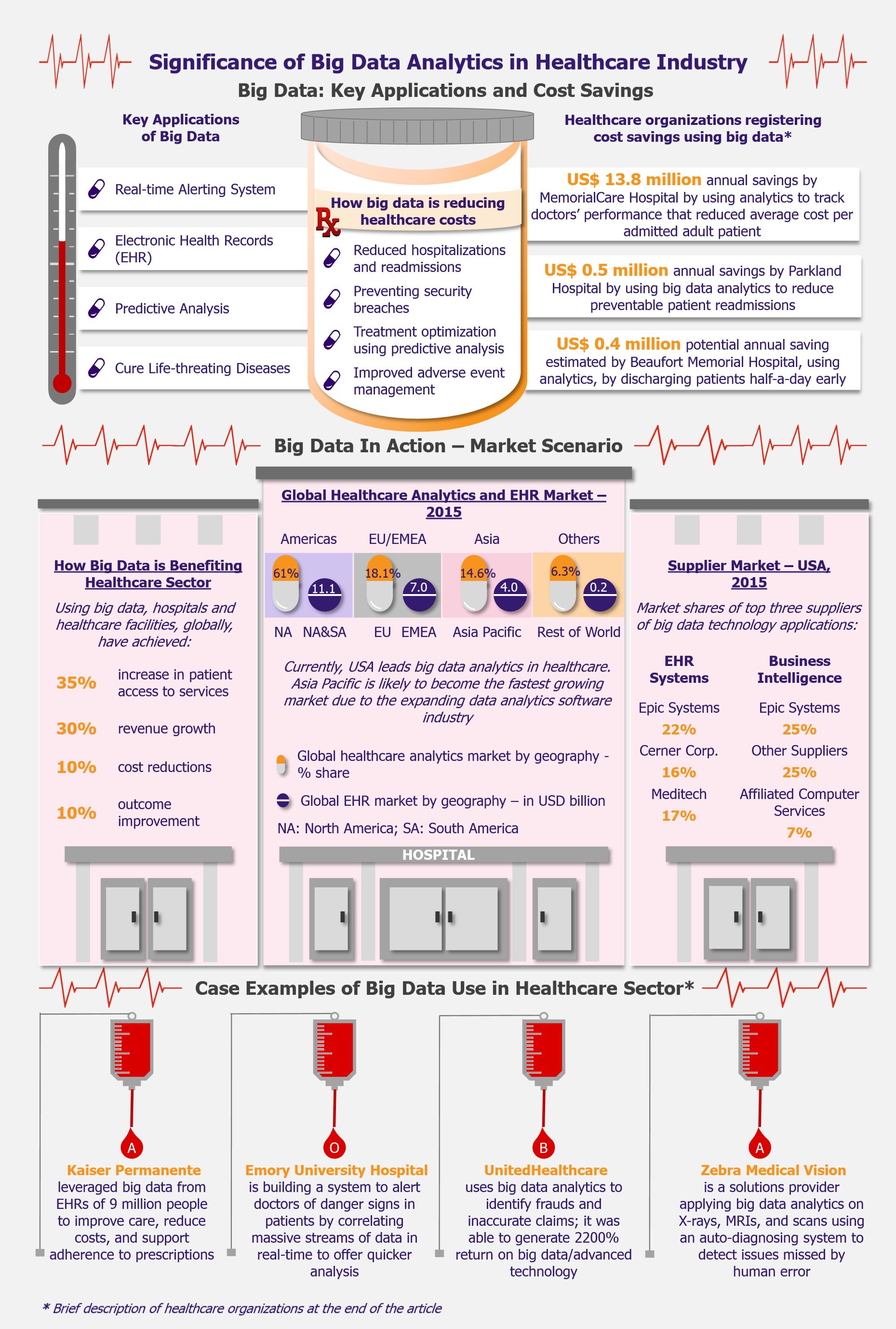Big data analytics is beginning to transform the healthcare sector by forging new pathways that lead to data transparency, reduction in healthcare costs, and improved patient outcome through better quality of healthcare services. Traditionally, physicians used their clinical judgment to make treatment-related decisions but over the last few years, the trend has shifted towards evidence-based decision-making by leveraging big data analytics, which correlates massive amount of data to provide quick analysis. Big data analytics is slowly changing the way data is managed, analyzed, and leveraged. Although the big data revolution is at an initial stage of its implementation in this sector and most of its potential for innovation and value creation is yet to be realized, it has already directed the healthcare industry on a path of rapid change and improvement.
In an era where healthcare data exists across different sources and formats – such as images, videos, texts, numerical data, etc. – such an enormous amount of data is incredibly complex and difficult to sort, organize, decipher, and manage. This is where big data analytics steps in. It aids in analyzing structured and unstructured data across multiple data sources, which helps to improve accuracy of diagnosing patient conditions and matching treatments with outcomes. Applying analytics in healthcare could reduce treatment costs, forecast outbreaks of epidemics, avoid preventable diseases, and most importantly, improve quality of life through better medical services.
Big data analytics has tremendous potential to cut down the spiraling healthcare costs. Analytics could be used to reduce preventable emergency room visits and hospitalizations, eliminate unnecessary lab tests, reduce inefficiencies, and avert security breaches and frauds, among others. Some key applications of analytics in healthcare include electronic health records (EHR), predictive analysis, real-time alerting system.
The EHR marketplace, part of big data analytics for healthcare market, in the USA is dominated by suppliers such as Epic Systems (a USA-based organization that develops software for healthcare sector) which held a market share of 22% in 2015. The EHR supplier landscape is consolidated at the top end, with three leaders (Epic Systems, Cerner, and Meditech) occupying majority share of 55% in the market in 2015.
Another segment of the big data analytics for healthcare, i.e. business intelligence market dealing with business intelligence tools support several major big data functions within hospital such as predictive analysis, clinical decision support, clinical workflow optimization, population health management, and financial performance modeling, is fragmented, unlike EHR. While Epic Systems occupies a sizeable portion of the business intelligence market (25% market share), over ninety vendors accounted for further 25% combined share of suppliers operating in the market in 2015.

EOS Perspective
For the longest time, healthcare has lagged behind other industries, such as banking and retail, in the use of big data. However, healthcare sector is now ripe for big data initiatives, which have the potential to completely transform the quality of healthcare services by offering a wide array of applications for predictive analytics, evidence-based accurate treatment decision-making, potential cure for complex diseases, improving clinical documentation, among many others.
For big data analytics to fully succeed, the healthcare industry must undergo few fundamental changes, so that the stakeholders can take advantage of big data. Some issues in the industry arise from resistance to change, as healthcare providers are accustomed to making treatment decisions independently, rather than relying on automation and analytics. Healthcare professionals need to shift from standard regression-based methods to more future-oriented techniques such as predictive analytics, machine learning, and graph analytics that can improve and quicken decision-making and treatment-related judgement.
Other obstacles are structural in nature – several healthcare professionals have chosen to underinvest in information technology because of unsure returns. Additionally, some hindrances stem from the nature of the healthcare sector itself. With presence of several players in the industry, it is not easy to share data with different providers or facilities due to privacy concerns, which hinders the use of analytics on data sets.
Currently, implementation of big data technology in healthcare is limited and mostly concentrated in the USA, largely due to the high infrastructure costs and hefty initial investment. Furthermore, the human expertise required to leverage healthcare analytics lags behind. Nonetheless, healthcare professionals are beginning to understand the value of leveraging volumes of patient data and efforts are being made to overcome all barriers.
Healthcare professionals are beginning to understand the value of leveraging volumes of patient data and efforts are being made to overcome all barriers.
Big data has the potential to completely revamp the healthcare sector, in the same way it has transformed several other industries. Besides reducing costs, big data initiatives could save many lives and improve patient outcomes. Pharmaceutical industry experts, payers, and providers are slowly starting to analyze big data to obtain insights. Although such efforts are in the preliminary stages, collectively they could help the industry to tackle issues such as variability in quality of healthcare and growing healthcare spend. Healthcare stakeholders who decide to invest in data capabilities and promote data transparency will not only achieve a competitive edge but will also lead the healthcare industry into a new era.
*Brief description of healthcare organizations – refer to the infographic
- USA-based healthcare organizations – MemorialCare Hospital, Parkland Hospital, Beaufort Memorial Hospital, Kaiser Permanente, Emory University Hospital, and UnitedHealthcare
- Israel-based organization providing technology/analytical solutions for the healthcare sector –Zebra Medical Vision
- USA-based companies providing software, hardware, and technology solutions and services for the healthcare sector – Epic Systems, Cerner, and Meditech
- USA-based provider of information technology solution, owned by Xerox – Affiliated Computer Services



